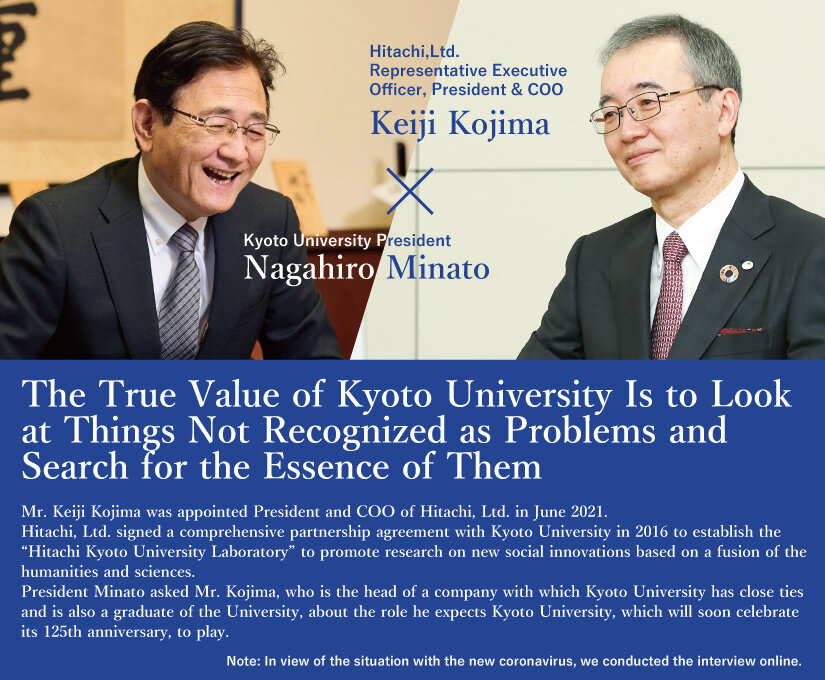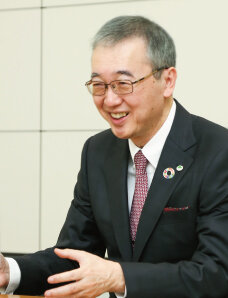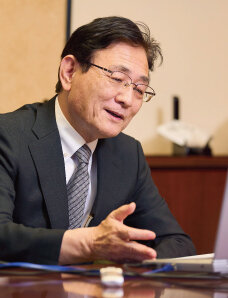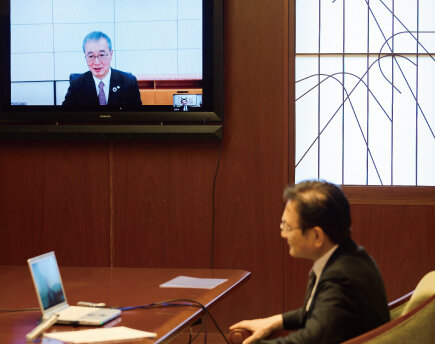Vol.20 Interview

Keiji Kojima
Born in Tokyo in 1956.
Completed the Graduate School of Science, Kyoto University, in 1982, and completed a doctoral program at the Graduate School of Information Science and Technology, Osaka University, in 2005.
Joined Hitachi, Ltd. in 1982. Dispatched to Carnegie Mellon University for joint research from 1989 to 1990. Seconded to Hitachi Computer Products, USA, from 1996 to 1999.
Became General Manager of the Central Research Laboratory in 2008, General Manager of the Hitachi Research Laboratory in 2011, Vice President and Executive Officer in 2012, Senior Vice President, Executive Officer and CEO of the Services & Platforms Business Unit in 2016, and Executive Vice President and Assistant to the President in 2018. Concurrently served as General Manager of Smart Life Business Management Division in 2020, and concurrently served as General Manager of Healthcare Business Growth Strategy Division in April 2021. Assumed current position in June 2021.
When I was in graduate school, I became interested in Kyoto
through serving as a guide for foreign researchers
Minato In June this year, Mr. Kojima became the president of Hitachi, Ltd., with which we have a comprehensive cooperation agreement, and I would like to ask him about his time at Kyoto University and his expectations for the University.
What memories do you have of your time at Kyoto University?
Kojima My older brother, who is two years older than me, majored in mathematics in the Faculty of Science at Kyoto University, so I went into the same field, but after meeting my professor, a specialist of pure mathematics, I realized that I had chosen the wrong faculty and department. My professor's intelligence was completely different from mine. So I had no intention of going on to higher education, and I had already received job offers from companies. My brother had stayed on at the university to become a research associate, so I felt that it was better to spread the risk, including financial aspects.
At that time, the teacher who had been taking care of me came back from studying abroad and kept me around, saying that I should continue pursuing my studies as a college student. So I made up my mind and stayed to study at the Research Institute for Mathematical Sciences (RIMS).

RIMS, which is a national joint-use research institute, had many overseas researchers visiting and staying in Kyoto. Since I had a car, at the request of my professor, I often took foreign researchers on tours around Kyoto. Unexpected questions from foreigners led to new discoveries, and I realized that Kyoto was an interesting place.
At the same time, my teachers pressured me to study English, so I went to English conversation classes at my own expense. One of my fondest memories of my graduate school days was living an unusual life, guiding foreigners around Kyoto and studying English conversation.
Minato In those days, there were a lot of teachers who would make reckless demands. I had similar experiences, but in my case, my professor's reckless demands triggered some kind of realization.
Kojima After I started working, I had many bosses who made reckless demands, so my experience in college was very useful in that I was used to such demands.
The strength of managers with a research background is that they
can think from different perspectives and come up with different ideas
Minato Since joining Hitachi, Ltd., you have worked in the research field. How did you feel when you became involved in management?
Kojima I was very attached to the word "research," which I consider to be the identity of Kyoto University, so I was sad to have to give up conducting research.
Minato What are the strengths of managers with research backgrounds?
Kojima I have been attending the Davos Forum for the past few years, and I have the impression that the number of corporate leaders with research backgrounds is increasing, especially overseas. In the days when GDP was rising steadily, companies were able to grow simply by doing business as usual, and the skills required of managers were to reliably solve problems that came up. However, in today's world, where issues are becoming more diverse and complex, companies cannot survive unless they not only face the issues in front of them but also anticipate issues and do something new. Companies likely put a researcher at the top because researchers can think differently.
Minato Perhaps the sensibility of science is necessary for the management of companies that are pioneering cutting-edge fields.
Kojima I think the important thing is to have no preconceived notions. I think the time has come for management to have the sense to think from the perspective of whether what is being said around them is really reliable and what the essence is, rather than simply believing what they hear.
Minato The sensitivity to see things from a different perspective is something that Kyoto University has always valued.
Kojima I agree. There are many different definitions of what the phrase "uniqueness of Kyoto University" means, but what many people consider not to be the uniqueness of Kyoto University is something that can be described as uniformity or as surmising people's thoughts.
Kyoto University's role is to get to
the bottom of what no one else is aware of
Kojima With so many issues emerging today, we have established joint laboratories in collaboration with several universities to conduct research on various themes. The theme of H-UTokyo Lab is to solve issues that are already apparent, such as energy problems.
Minato You mean themes that seem to be well known as a social issue.
Kojima On the other hand, when we decided to open a laboratory with Kyoto University, we thought that solving real-world problems would not fit with Kyoto University. I believe that the role of the Hitachi Kyoto University Laboratory is to think about the essence of things other than what is already being talked about or what we think we can see.

Minato I hope that you will tackle themes that can only be explored at the Hitachi Kyoto University Laboratory.
My own recent concern is the aging of the population. It affects you slowly, like a body blow. Events that go unnoticed can be irreversible unless we are very conscientious about them.
Kojima It is up to the H-UTokyo Lab to come up with countermeasures against phenomena caused by the aging of the population. At the Hitachi Kyoto University Laboratory, when some phenomena occur, we hope to study the phenomena as they occur, thinking about where the essence of the phenomena lies so that we can hold discussions to take action on the essential parts.
Minato That is very reassuring.
Surprisingly, it is estimated that about half of the children born after 2000 will live to be 107 years old. The 100-year life span era is definitely coming, and there are many things that need to be addressed, not to mention physical matters such as securing assets. One of the most important things is to review life stages. Universities, which are responsible for education, and companies, where people spend the majority of their lives, will also need to take action, and I believe the key is to guarantee flexibility.
In Japan, life stages are rigid. People enter university at 18, start working at the same time, and retire at about the same age. A year's delay in entering college is a big deal. But that separation will become less and less meaningful. I think we need to be more flexible, allowing people to learn and work according to their own motivations and values and introducing a system like "recreation," where people can start something again after retirement.
Kojima I believe that as our lives become longer, things that used to be distinguished in terms of time and space will come together in various situations. With the new coronavirus, currently, telework and other forms of work are being introduced, and life at home and at work are beginning to overlap, but in the future, we may see even more merging, with all the differences between school, work, and home disappearing.
As for the aging population issue, we will need to bridge the gap between generations. Inheritance is another example. Since most of the personal financial assets are lying dormant in the form of savings, the Japanese economy will not be able to keep going unless it is passed on to the next generation as soon as possible.
Minato I see. So all boundaries become less clear.
Kojima The aging population may fundamentally change human life.
Minato I hope that you will tackle themes that are unique to the Hitachi Kyoto University Laboratory for the future as humanity enters new realms.
Kojima It is important for companies to earn money first by treating symptoms as they appear, but doing so alone will not create innovation or solve the essence of the problem.
It has been pointed out that Japan lags behind in digitalization and is behind in many aspects, but if we can get to the essence and take steps, we may be able to change the future. I believe that at the heart of this is the Kyoto University stance.
Challenge the unimaginable in an environment
where one is left alone
Minato This is a personal interest of mine, but while I feel familiar with the hardware infrastructure, since I am not good at IT, the fusion and compatibility of hardware and digital is something I am very concerned about. What does your company think about the balance between the two?
Kojima I believe that there are three types of companies. There are pure hardware companies, which manufacture products, pure digital companies, represented by IT companies, and cyber-physical companies, which deal with both hardware and digital. We are of course aiming for the third type and hope to successfully integrate the skills of each type.

It is not desirable to be too digitally biased. This is because, in terms of digitalization, we cannot beat IT companies. I believe that only American companies can win in the digital world. America gives us some freedom when innovation occurs in the digital world. In China, the government tries to control innovation, while Europe tries to standardize innovation by regulating it first. Japan also has quite a few regulations. Therefore, as a company originating from Japan, we believe that we cannot compete in the world unless we strike a balance between the real and the digital.
Minato I feel safer when things are in circulation than when information and money are in circulation.
Kojima The world will change dramatically on the real side. Innovation in the areas that form the basis of the world, such as life sciences and materials, will have the strongest impact. Although digital technology is superior in accelerating innovation, I believe that the base of innovation is the real side, the hardware side.
Minato I am relieved to hear that.
Jared Diamond, an American evolutionary biologist and physiologist, said, "Necessity is not the mother of invention, but invention is the mother of necessity." I think that in most cases, inventions are not made out of necessity, but rather by first discovering something and then finding a way to use it through trial and error. Advances in the underlying science may lead to some innovation.
Thank you for your patience with a topic of my personal interest.
Lastly, do you have a message for Kyoto University students? I believe that the words of the president of Hitachi, Ltd. will resonate greatly with students.
Kojima I believe that Kyoto University's great strength is its mindset of looking at things as they are and thinking about them without surmising people's thoughts or making assumptions.
There is no teacher at Kyoto University who trains his/her students by imposing his/her ideas in the educational system. Kyoto University teachers leave students alone and help them from time to time. I imagine that this is also a system that does not create stereotypes and assumptions. Because teachers will leave students alone as much as possible, I think that students should go and ask questions of their teachers and make good use of their power.
Doubt what the world tells you, look at what it does not tell you, and always consider the essence. That is the kind of person that companies and society are looking for.
Minato Then Hitachi will hire you (laughs). Thank you very much for your time today.
--------------------------------------------------------------------------------------------------------------------------------
Q & A with Hitachi, Ltd. Representative Executive Officer, President & COO Keiji Kojima
We asked Mr. Kojima about his life as a researcher and what he values as a researcher.
Q Are there any episodes related to the development of the Lumada※ business that you launched and any beliefs and things you kept in mind during the process?
A We launched Lumada in 2016 in cooperation with overseas members, and from the beginning, we were strongly conscious of the fact that Lumada should not be developed as a single software or computer OS product, but rather as a collection of cases of use (initiatives) by various customers. That is why we avoided naming the system "... X," which is reminiscent of an OS. This is the opposite of the usual approach of building a solid platform and then putting apps on top of it. In the beginning, people inside the company did not understand what we were doing and asked us many times to give them a price list for Lumada. Today, Lumada has grown into a business worth more than one trillion yen and is well understood both inside and outside the company. It is important for leaders to have a vision for the next few years or decades, even if it is not immediately understood by those around them, and to continue to demonstrate the ideas backcasted from that vision without wavering.
※ Lumada:A generic term for solutions, services, and technologies that leverage Hitachi's advanced digital technologies to create value from customers' data and accelerate digital innovation. Lumada is a coined word that combines the words "illuminate" and "data."
Q You served as a guide for foreign researchers when you were a graduate student at Kyoto University, and you have also worked overseas for Hitachi, Ltd. Did your experiences abroad, including encounters with diverse people, have any influence on your own ideas and thought processes?
A When I was stationed in the Silicon Valley, I participated in a joint development project with a U.S. venture company for three years as a Japanese development leader. I felt the thrill of worrying how much money was left in the venture company's bank account, and it was like riding a roller coaster, experiencing not only technology development but also many other things. As a researcher, I think the best thing is to be able to immerse yourself in research, but being exposed to the outside world and diverse values gives you the mindset to enjoy various experiences and grow. The fact that I have been able to develop my career as a researcher and a manager may be due to my experience of looking outward and enjoying everything since my days at Kyoto University.
Q What do you try to do to create new ideas, or how do you get out of a slump?
A A senior Hitachi employee whom I respect said: "Only incompetent managers lament that their products have become commoditized. If you feel that way, start innovating." These words, along with my motto, "Walk the walk instead of talking the talk," are my guiding principles. In order to foster innovation, I am constantly monitoring global events and accessing parties involved in innovative matters to keep abreast of trends and changes. In addition, since I learned vocal music as a student, I love music of any genre, so my audio room at home is an important place for me to relax and rejuvenate myself.
(Held in August 2021)

